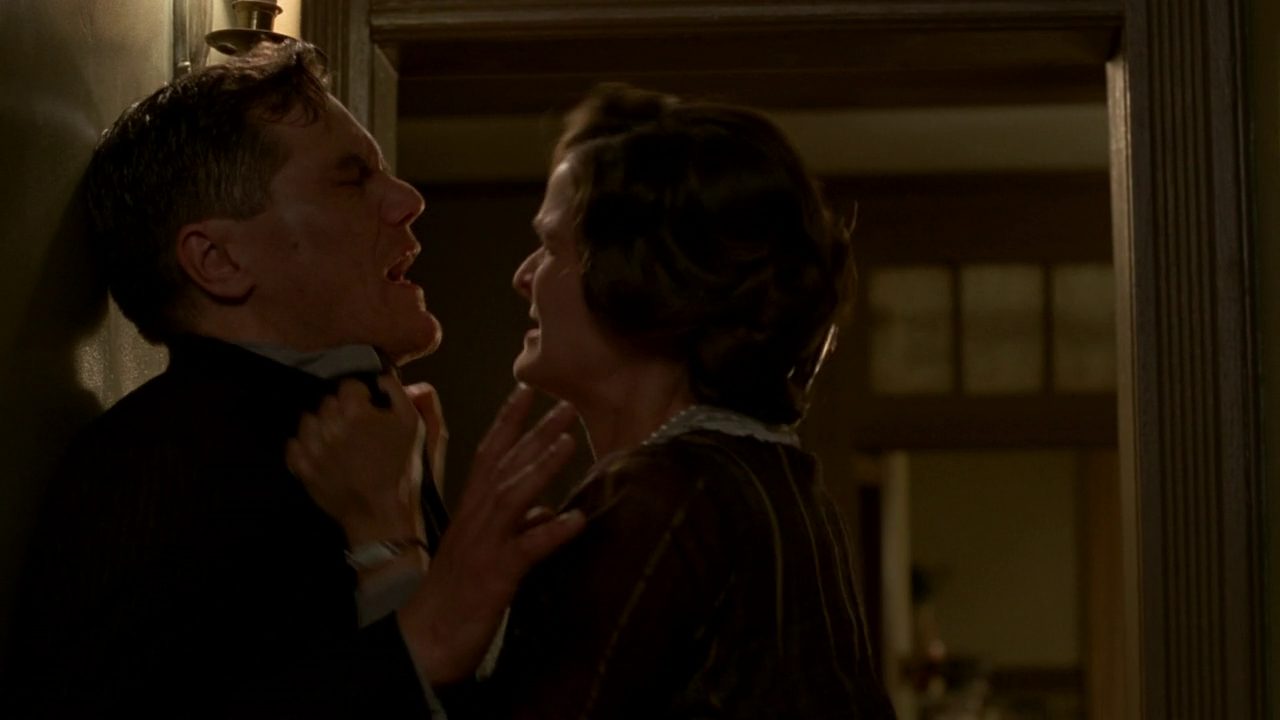
One element that’s consistently set Boardwalk Empire apart from nearly every other crime show and serial drama on television is the seriousness of its treatment of faith and religion. Just because the show is willing to exploit its characters’ beliefs for other purposes—spectacle, for instance—doesn’t mean it’s not there. It’s one of those aspects of Boardwalk Empire that makes it feel more like Martin Scorsese’s films than something by Francis Ford Coppola or David Chase. The “Age of Reason” means the dawning of a personal conscience and the ability to perceive right from wrong. It’s religious, certainly, but apart from that it’s about taking personal responsibility for your own actions.
Prohibition Agent Nelson Van Alden has long had faith as one of his driving motivations in life, and his role in the second season has been trying to straddle his religious fervor with his own sordid actions. Just because he’s sinned doesn’t mean he’s lost his belief, however it has been causing a rift in his relationship with his wife. When Van Alden makes a phone call to her during the midst of a guilt-induced crisis, she returns to Atlantic City and meets his mistress Lucy Danziger and her new child. This has been a long time coming, and it finally manages to make Van Alden’s storyline interesting in the second season. After being a driving force early on, recently he’s just been tending to Lucy and wrestling with his personal demons. The question of what’s next for him now that the baby is finally here leads to opening up his role in the show and making it larger.
The other central question of faith in the episode concerns Margaret’s son’s first communion. The priest asks that Margaret set an example for her son and go to confession as well, but obviously this worries Nucky who wishes that his affairs remain private. Margaret decides to confess nonetheless, but her only confession is her betrayal towards Nucky: an attraction to his new hitman Owen. This is telling about how she really feels about Nucky. While unmarried, she still considers him a spouse and feels no guilt about what she needs to do to stay with him and help him. Even though in the eyes of God a relationship with Owen would be the same as one with Nucky, that’s not how she sees it.
The rest of “The Age of Reason” doesn’t strictly concern religion, but it’s still about consciences and betrayal. First Jimmy randomly spies one of the men he hired from Philadelphia walking down the boardwalk with Nucky and Waxey Gordon. He and Manny the Butcher capture him and extract information before killing him, which leads them to where Lucky Luciano is travelling with a shipment of booze. Here they enact a deal betraying Nucky, so we see in close succession the way Jimmy will treat traitors before shortly afterwards paying someone to betray. Things also don’t go so well for Nucky in Washington, when a Senator forces the Attorney General to treat the case against Nucky more seriously.
Through all of this Boardwalk Empire is never devout like Mean Streets, but it’s very much interested in the way that religion and in particular guilt (that the two religions the show focuses on are Judaism and Catholicism is significant in this way) play a part in the choices people make. Nucky’s relationship with the Attorney General doesn’t pan out simply because the General has no guilt or, seemingly, conscience. He doesn’t feel like he has a debt to be paid. Had Van Alden not felt like his colleague’s words spoke about his own secret and that the flickering lights had nothing to do with divine judgment, he could have continued his secret life. But his religious guilt worked against him here and revealed him.
This was a less explosive episode than the last two, but it was still quite good, even when concerning Lucy and Van Alden. Let’s just hope that this means Van Alden rejoins the rest of the story soon so that we can see what consequences his affair had for people other than himself.
Stray observations:
•”How can we avoid the fires of hell if we can’t stop sinning?” – That’s basically a line ripped straight from a Scorsese flick.
•”Feminine wiles” back in the 1920s apparently just meant sex.
•”How is he still alive?” “He loves the lord, sir.” “Seems to be a one-sided relationship.”
•Richard Harrow’s line reading of, “I don’t fucking believe this” was wonderful.